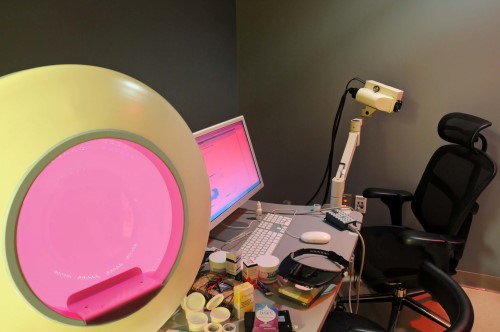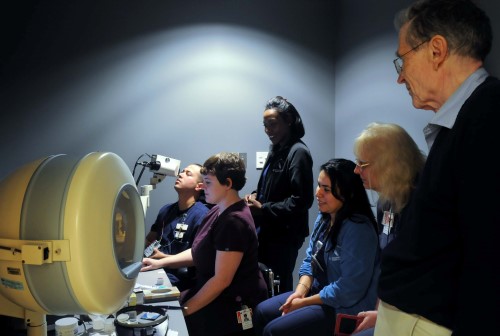Retina Service Acquires ERG machine for clinical practice, first and only in Worcester area
Date Posted: Monday, September 12, 2016The Department of Ophthalmology & Visual Sciences has officially acquired ERG (electroretinogram) machine. The machine will be utilized in the Retina service and will be the first and only machine in the Worcester area. The ERG test can aid Retina specialist in detecting electrical activity and abnormal function of the retina.
The ERG machine will be a valuable asset in the clinic, consisting of two components Multifocal and Full field Tests. The ERG provides trivial diagnostic information in a range of retinal diseases. It can be also used for monitoring toxicity of various drugs, one example is (Plaquenil). We believe that the ERG will be of great benefit and will provide enhanced care for our patients in the community.

Below is a list of Diseases (both common and rare) in which the ERG can provide diagnostic information.
- Multiple evanescent white dot syndrome (MEWDS)
- Vitamin A deficiency
- Cone dystrophy
- Melanoma associated retinopathy (MAR)
- Congenital Achromatopsia (typical (rod) monochromat)
- Congenital Red-Green Color Deficiency
- Congenital Hereditary Stationary Night Blindness (Schubert-Bornschein type)
- Oguchi disease
- Fundus Albipunctatus.
- Fleck Retina of Kandori
- Stargardt Macular Dystrophy (Fundus Flavimaculatus)
- Best Vitelliform Macular Dystrophy
- Pattern dystrophies
- North Carolina Macular Dystrophy
- Progressive Bifocal Chorioretinal Atrophy
- Fenestrated Sheen Macular Dystrophy
- Familial Internal Limiting Membrane Dystrophy
- Gyrate Atrophy
- Choroideremia
- X-linked Juvenile Retinoschisis
- Goldmann-Favre Syndrome
- Wagner Disease
- Autosomal Dominant Neovascular Inflammatory Vitreoretinopathy
- Autosomal Dominant Vitreoretinochoroidopathy
- Familial Exudative Vitreoretinopathy
- Birdshot Retinochoroidopathy
- Pseudo-Presumed Ocular Histoplasmosis Syndrome (Multifocal Choroiditis)
- Behcet Disease
- Sickle Cell Retinopathy
- Takayasu Disease
- Carotid Artery Occlusion
- Central and Branch Artery and Vein Occlusions
- Chloroquine and Hydroxychloroquine toxicity
- Thioridazine
- Quinine
- Methanol
- Gentamicin
- Kearns-Sayre Syndrome
- Siderosis

(Above) Technicians from the Ophthalmology Department during training
